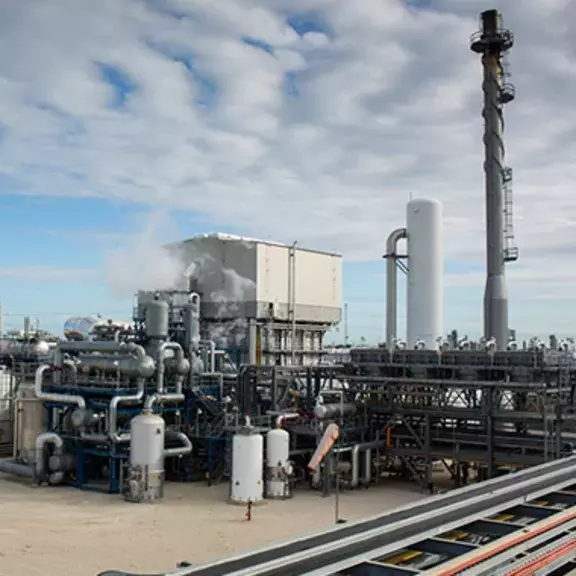Methanol Purge Gas Applications
Recovery and recycling of excess hydrogen
Hydrogen Recovery
Syngas employed for methanol comprising principally carbon monoxide (CO), carbon dioxide (CO2) and hydrogen (H2) is fed to a catalytic reactor. The reactor offgas is cooled to condense product methanol and yield a reactor purge gas stream. This gas stream contains unreacted H2, CO and CO2. Also present are methane (CH4), N2 and depending on the source of the syngas, argon (Ar). Removal and recovery of hydrogen has been shown to increase methanol production between 2-4%, which in large plants is quite significant. Air Liquide Advanced Separations' (ALaS) membranes placed in the reactor purge gas loop downstream of the methanol separator recover 80-90% of the H2 in the gas stream. H2 is recycled back to the syngas compressor loop, while the residue gas rich in CO, CH4 is purged by way of the fuel gas header. ALaS offers a range of high performing polyaramide and polyimide membrane products for customers to consider. Utilizing ALaS membranes in a methanol reactor purge gas loop recovers and profitably utilizes H2; customers are able to realize increased methanol production as almost soon as the membrane unit is started up.
The Technology
Hydrogen (H2) is selectively separated from methane (CH4), nitrogen (N2) and argon (Ar) by permeation through a polymeric hollow fiber membrane. The driving force is the partial pressure difference across the membrane for H2 , CH4 and other gas components. H2 is the “fast” gas, whereas inerts are the “slow” gases. The pressurized feed gas enters the bundle from the shell side; the syngas stays under pressure while the H2 is collected at a lower pressure from the fiber bore.
-
Hydrogen Membrane Overview
Download the document PDF (5.56 MB)
Advantages
- H2 Recovery > 90%, H2 Purity > 90%
- No moving parts
- Skid mounted systems cartridge design for simple installation
- Estimated payback period of less than a year
- High permeability membranes for compact, low capital system design
- Automated & unrestrained turndown system for ease of operation and safety
- Linear scale up for all size systems
- Hollow fiber membranes offer higher area to volume efficiency resulting in better packing efficiency, smaller footprint and reduced weight and module count
Request information
Paul Terrien, Director, Hydrogen and Helium Membrane Business Units
Contact by phone +1 781-228-3261
Related applications
Air Liquide Advanced Separations’ (ALaS) hollow fiber membranes offer the most robust solution for hydrogen purification needs.

